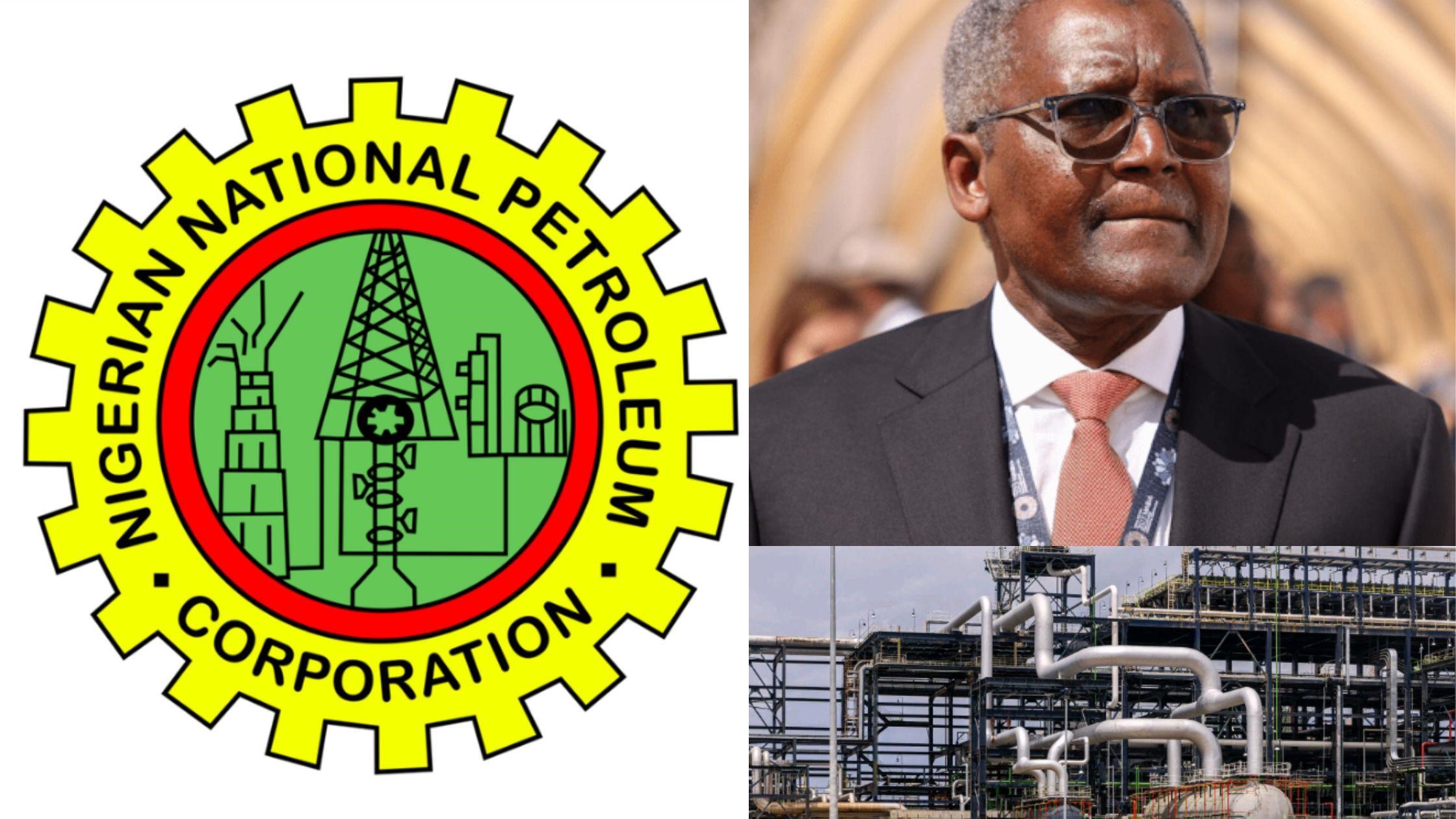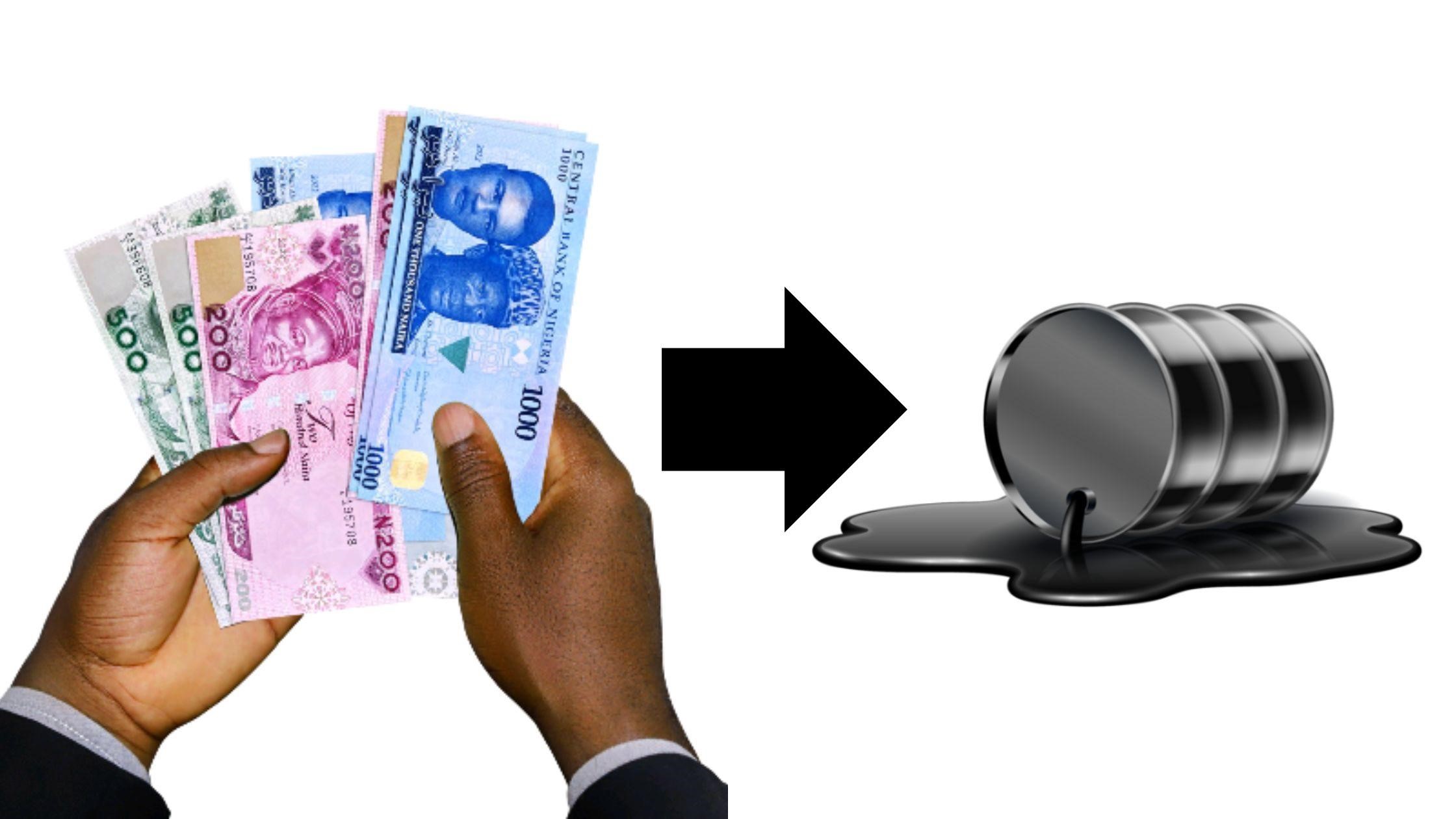![]()
![]()
![]()
NNPCL and Dangote Refinery in Talks to Renew Naira-for-Crude Contract

The Nigerian National Petroleum Company Limited (NNPCL) and the Dangote Petroleum Refinery are back at the negotiating table, engaging in crucial discussions regarding the renewal of their groundbreaking naira-for-crude agreement. These talks come at a pivotal time, with the initial deal set to expire on March 31, 2025, prompting a reevaluation of this innovative arrangement.
NNPCL's disclosure on Monday served as a direct response to swirling rumors and social media reports that had claimed the government-owned oil giant had unilaterally terminated the naira-for-crude deal until 2030, citing the forward sale of all its crude oil. These claims had ignited concerns about the future of the agreement and its potential impact on Nigeria's energy sector.
Adding weight to the importance of this agreement, fresh data obtained by The PUNCH revealed that the Dangote refinery, a $20 billion behemoth located in Lekki, had received a substantial volume of crude oil, valued at approximately N486.31 billion, under the naira-for-crude deal between October and December 2024. These figures underscore the significant financial implications and the scale of the transactions involved.
To provide clarity amidst the confusion, Olufemi Soneye, the NNPCL Chief Corporate Communications Officer, issued a statement on Monday. He confirmed The PUNCH's exclusive report from last year, stating that the initial naira-for-crude deal was indeed a six-month agreement. Soneye further added that discussions for the renewal of this agreement are actively underway, with the aim of establishing a new contract that will govern future transactions. This confirmation and clarification from NNPCL are crucial in dispelling misinformation and setting the record straight.
Soneye also shed light on the volume of crude oil supplied to the Dangote refinery under the agreement initiated in October 2024. He stated that the 650,000-capacity refinery had received 48 million barrels of crude oil to be refined into petroleum products. Furthermore, he revealed that a total of 84 million barrels of crude oil had been supplied to the refinery since it commenced operations in 2023, highlighting the cumulative volume of crude provided to support the refinery's operations.
The NNPCL spokesperson also clarified a critical aspect of the deal: that the supply of crude oil was 'subject to availability.' This caveat acknowledges the dynamic nature of crude oil production and supply, emphasizing that the agreement's implementation is contingent on the availability of resources. This clarification is important for managing expectations and understanding the practical limitations of the agreement.
In its statement, NNPCL reaffirmed its commitment to supplying crude oil for local refining, emphasizing that this supply will be based on 'mutually agreed terms and conditions.' This commitment signals NNPCL's intention to continue supporting domestic refining capacity and fostering a collaborative relationship with refineries like Dangote.
Similarly, Zacch Adedeji, Chairman of the Technical Sub-Committee on the naira-for-crude deal and Chairman of the Federal Inland Revenue Service, reaffirmed the government's unwavering stance on the policy. He emphasized that the termination of the contract was never under consideration, dispelling any doubts about the government's commitment to the initiative. Adedeji stated that there is 'substantial evidence' supporting the policy as the correct approach and affirmed that it will continue to contribute positively to the nation’s economy.
Adedeji further clarified that 'the policy framework enabling the sale of crude oil in naira for domestic refining remains in force.' He reiterated that 'the initiative was designed to ensure supply stability and optimize the utilization of local refining capacity.' He stressed that 'there has been no decision at the policy level to discontinue this approach, nor is it being considered.' Adedeji's statements provide reassurance that the policy is still a key component of the government's economic strategy.
He also emphasized the positive impact of the policy after several months of implementation, stating that 'After implementing the policy for some months, evidence abounds that it is the right way to go, and it will continue to help the economy.' This affirmation highlights the government's belief in the policy's effectiveness and its contribution to economic growth.
Adedeji also addressed the pricing environment, revealing that 'the framework for domestic crude transactions is designed to promote a competitive and efficient pricing environment.' This statement suggests that the policy aims to foster transparency and fair pricing in the domestic crude oil market.
Furthermore, Adedeji clarified the role of local refineries in accessing domestic crude supply. He stated that 'local refineries have not been excluded from domestic crude supply' and that 'the Nigerian Upstream Petroleum Regulatory Commission is actively ensuring compliance with the Domestic Crude Oil Obligations provisions of the Petroleum Industry Act.' This clarification emphasizes that the policy is inclusive and aims to support the entire domestic refining sector.

Adedeji further explained the process for crude oil supply to domestic refineries, stating that 'the engagement process for crude oil supply to domestic refineries therefore remains in place by structured agreements, balancing factors such as availability, demand, and market conditions.' This explanation highlights the structured approach to crude oil allocation, taking into account various factors that influence supply and demand.
He concluded by reaffirming the government's commitment to the initiative, stating, 'We remain committed to ensuring the efficient execution of this initiative in line with its core objectives – enhancing local refining, reducing foreign exchange exposure, and stabilizing the domestic fuel supply.' This statement reiterates the government's dedication to achieving the policy's goals.
Commenting on the ongoing contract renewal discussions, Eche Idoko, the Publicity Secretary of the Crude Oil Refinery-Owners Association of Nigeria, stated that the renewal was part of the original plan. He emphasized that there have been no changes to the initial discussions, providing further confirmation that the renewal process is proceeding as expected.
However, Idoko also urged the government to honor its commitment to meeting the 27,000 barrels per day demand from modular refineries. He stressed the importance of fulfilling this promise for the continued success of the industry, highlighting the need to support smaller refineries alongside larger ones like Dangote.
Speaking in an interview, Idoko stated, 'What the Federal Government said to us during our meetings last year was that they were going to start the pilot phase with Dangote, and when it ends, the second phase, which will start after March, will cover other refineries with a capacity of 27,000 barrels. The reason they started with Dangote was because they needed a refinery that could produce petrol, and only Dangote could do that.' This explanation provides context for the initial focus on Dangote Refinery and the subsequent plans to include other refineries.
Idoko further emphasized the importance of modular refineries, stating, 'But we also know that diesel is consumed by trucks that carry foodstuffs, which ultimately drives up the price of products, so modular refineries are important, and we really hope that they would fulfill that promise, as discussed, to include other refineries.' This highlights the crucial role of modular refineries in supplying diesel and their impact on the overall economy.
He also highlighted the gains of the agreement, stating, 'We have seen a reduction in the price of products on one hand, and the naira has performed well against the dollar. Given this success, we are supposed to just enter the second phase and not say the government is renegotiating with Dangote. It is supposed to be with all the refineries.' This statement underscores the positive outcomes attributed to the naira-for-crude deal and advocates for its expansion to include more refineries.
Meanwhile, an analysis of crude oil liftings obtained from the NNPCL monthly presentations at the monthly Federal Account Allocation Committee meetings between October 2024 and the last FAAC meeting held in February 2025 showed that the Dangote refinery receives crude supply worth N486.31bn.1 The national oil firm noted that the transactions were valued at $373.76m, and payments were made at an Afrexim Bank-advised exchange rate payable in naira, amounting to N486.31bn. However, as of last month, the documents indicated that a total of $126.99m at an equivalent of N199.96bn was listed as obligations due for remittance and yet to be paid.
It further stated that all products were supplied to the refinery under a credit facility, with a payment due date set for 45 days from the date of barrel liftings. It was observed that the crude oil figures were disclosed post facto, with the December data shared during the company’s last meeting in February 2025. The figures reported in January and February are expected to be presented to the FAAC committee during its meeting in March and April 2025. The report revealed that on October 14, 2024, the $20 billion Lekki-based refinery received its highest allocation of crude oil, totalling 598,125 barrels. In contrast, on October 30, 2024, the refinery’s lowest allocation was 5,000 barrels. Additionally, the government only fulfilled its daily oil requirement on four occasions during this period.
A detailed breakdown of each transaction revealed that the first shipment, which was loaded onto the Sienna vessel carrying 100,000 barrels of crude oil, was received on October 14. This shipment was sold at a unit price of $78.56 per barrel, corresponding to invoice number PSC10.24.001. The total value of the transaction amounted to $7,856,870, which, when converted at N1,628, equals approximately N12.797bn.2 The second transaction with invoice number PSC 10.24.002 was initiated on the same day with 598,125 barrels supplied.3 It was sold at a unit price of $78.56 per barrel with a dollar value of $46,993,903 and the equivalent of N76.54bn using an exchange rate of N1,635 per dollar. The next allocation with invoice number PSC.10.24.009 was initiated on October 23, with 597,917 barrels delivered via vessel Sonangol Kalandula to the refinery.4 It was estimated at a unit price of $78.67 per barrel and a total value of $47,043,332 and naira equivalent of N77.64bn. An exchange rate of N1,650 was used for this transaction. Similarly, a supply of 350,000 barrels was delivered on the same date at the same unit price and exchange rate. This transaction with invoice number PSC 10.24.008 was valued at $27,537,545 and a naira equivalent of N45.45bn.5 The next day, October 24, another supply of 250,000 barrels was submitted at a unit price of $75.37 per barrel at a total cost of $18,844,675 and N30.814bn naira equivalent. An exchange rate of N1,635 was utilised for this transaction with invoice number PSC.10.24.018.
Posted on: Mon Mar 24 2025 Back to postsContact us on any of our socials for inquiries
Other Categories
